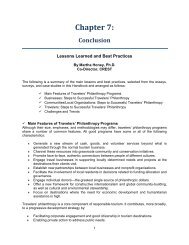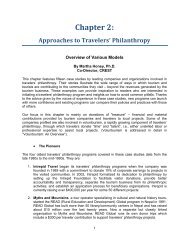Travelers' Philanthropy Handbook - Center for Responsible Travel
Travelers' Philanthropy Handbook - Center for Responsible Travel
Travelers' Philanthropy Handbook - Center for Responsible Travel
Create successful ePaper yourself
Turn your PDF publications into a flip-book with our unique Google optimized e-Paper software.
them, a precedent they value. Its construction, financed by innocent outsiders, challengeslong-standing gender relationships and portends further challenges in the future.Think of this situation in geographical terms. Where you locate a well or school or clinic orbridge or any other piece of physical infrastructure is going to benefit some people more thanothers. Some people will ask, “Why did those <strong>for</strong>eigners build the clinic on the other side of theriver and not on our side?” “Why did they build the bridge five miles upriver, which helps peoplein the rival village much more than it helps us?” You can easily imagine a sense of grievancedeveloping because some people gained more from an amenity than others. As a general rule,those benefitting from an amenity are likely to take it <strong>for</strong> granted and not think much about itonce it’s in place. But those who don’t benefit from it, or who benefit less than others, continueto dwell on what they have lost. A sense of grievance persists longer than a sense ofsatisfaction.When an act of generosity from the outside can be interpreted by village elites as lowering theirpower, income, and status, then it is seen as a backward move. What can elites do? Oneobvious option is to sabotage the project. Sabotage is quite easy once the project’s fundershave left, as tourists do shortly after they’ve made some kind of oral or signed contract with avillage notable. “Now they’ve gone,” thinks the notable. “But I’m still here. And I will still behere years from now. The power I have will be used to stop this project in its tracks.”So I, the tourist, may find my best intentions thwarted by the very person who smiled withapparently genuine thanks as he signed the contract with my tour group manager. It turns outthat this person would rather have no project than one that could conceivably hurt his relativeposition in the village hierarchy. This is not to say that the village notable is a bad person.Rather, it confirms that he is a human being. Everywhere you have status systems, whichmean systems where people’s sense of their own worth is defined relative to their sense ofothers’ worth. Even if the project helps them in an objective sense, if it harms them in asubjective sense they will do what they can to slow down the project or cancel it altogether.• A Simple Photo and A Thank You: It’s More Complex Than It SeemsNow let’s take a third situation. As adonor I prefer to give to something Ican take a picture of. I want a photo,three months later, a year later, and oncompletion, of that well, bridge, orclinic. I want pictures showing happypeople drawing water from the welland walking across the finished bridge.I want to see happy kids in front of anew health clinic, showing off thebandages on their arms where thenurse vaccinated them <strong>for</strong> yellowfever. I don’t ask <strong>for</strong> much in returnTourists in Banff, Canada<strong>for</strong> my generosity. But I do ask <strong>for</strong>Credit: Itdan's Photothose pictures. If nothing else, theyprove that my money was not embezzled <strong>for</strong> someone’s private use but was actually put to itsintended purpose.183















